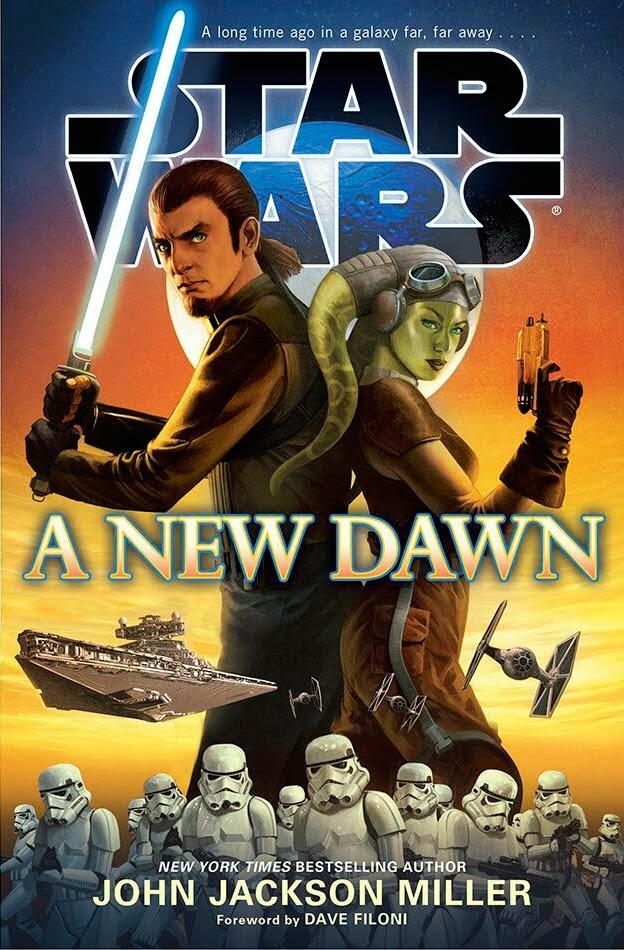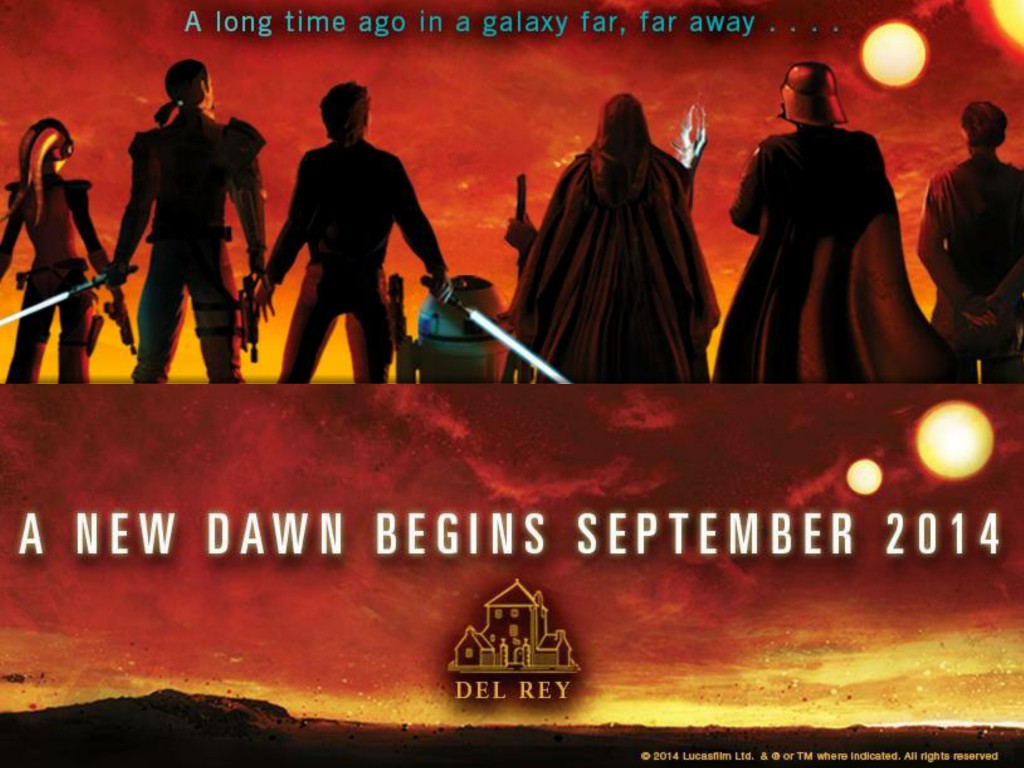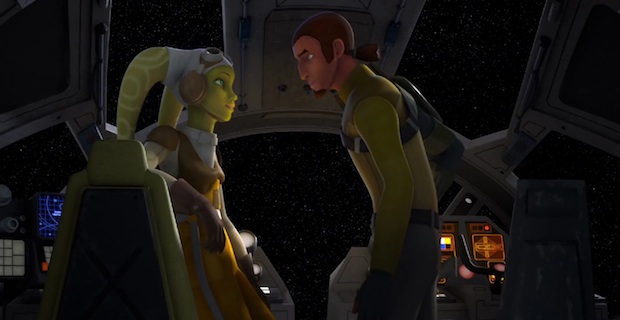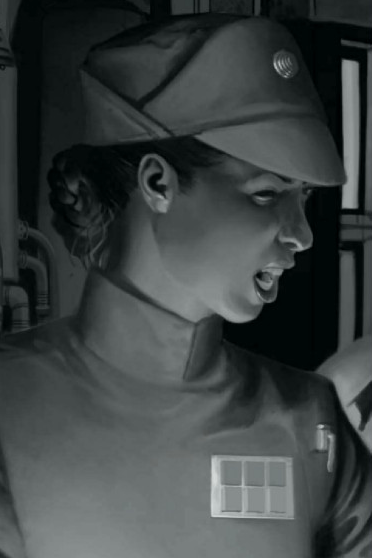Last week, famed Star Wars author John Jackson Miller sat with Alex Rybak of Yoda’s News to converse in the ways of the Force. Miller recently released A New Dawn, the first book in the newly launched line of adult fiction in our favorite galaxy far, far away. Alex and John discussed the genesis of A New Dawn, the role of the newly formed Lucasfilm Story Group, and much more. Check out the full interview below.
Yoda’s News: Mr. Miller thanks for joining us here at Yoda’s News. Let’s start off by talking about how you were approached to write A New Dawn and the role it would play in a new era of Star Wars literature.
John Jackson Miller: The genesis of A New Dawn was in late 2013. I had just written Kenobi and they were looking at Del Rey for someone to write a book that would be sort of a heroic counter-weight to some of the darker books that are in production. Of course, you’ve got Tarkin and The Lords of the Sith books that are coming out. There was also this desire to do something that would possibly tie-in to Rebels. The fact that Rebels would be coming out in the fall of 2014 meant that whatever I was gonna do, [it] would have to come out fairly quickly. So I worked with the Lucasfilm Story Group, which included Dave Filoni and the other executive producers, to sort of give me some background on what was gonna be happening in Rebels. More importantly the backgrounds of two characters, Kanan and Hera, which I use in my book. They [the Lucasfilm Story Group] were able to provide for me what was going on in their [Kanan and Hera’s] lives at this point in time.
I was then able to make it fit with the story that I had in mind about an early act of defiance against the Empire, which takes place during the course of A New Dawn. So all of that fit together. It was only really late in the process (I had been writing for quite some time) that I was informed that this book would have an introductory role because it was going to be the first book coming out in the Lucasfilm Story Group era of writing. So I did a little bit of adjusting, just to make the book feel a little more… introductory, I guess [laughs]. But otherwise, it wasn’t a big change because I always try to write my books as if they’re the first book you may be reading in a given universe.
YN: So do you feel, as a writer, that not knowing alleviated some of the pressure that would have come about if you had known ahead of time the role that A New Dawn would play?
JJM: Oh yea, absolutely. I would say the job that you take, first and foremost, is to write a good Star Wars book and I would have tried to do that [under any circumstances]. I think it really does work well that the first in this new era of publishing would have been a book that feels like it fits in any time. This book could have come out five years ago, ten years ago, or fifteen years ago and it would have felt like it fit right in. I wanted to express to readers that even though they were making some adjustments to the overall scheme of things, there was still continuity. We were still gonna be trying to [publish] entertaining Star Wars novels. The characters would still be reflective of the kinds of characters you would see the movies, the themes would be reflective of the kinds of themes that you would see in the movies, and the universe would feel like the same universe.
YN: A New Dawn, like you mentioned, serves as a prequel to the upcoming Star Wars Rebels television show, which premiers October 2014. Was there something about Kanan and Hera, specifically, that drew your interest to incorporate them into this novel? Or was that a directive you were given, to utilize these two precise characters?
JJM: Well I was given some choices as to when I could write my novel, or when it would be set. I chose the earliest possible point that I could go for because I wanted to really dig into this period of the Empire. They are consolidating their control. A lot of the people still aren’t aware of the “bad” things the Empire is doing. A time when there are still a whole lot of people who are in favor of the Empire and are consciously and willingly advancing its causes. So, that led me to this earlier time and it was very helpful to me that it fit in to what they [the Lucasfilm Story Group] wanted to do as well. They were able to give me the earliest thing that they had, which was Hera and Kanan meeting. Everything else flows from there.
YN: Can you tell us a little bit about what it’s been like writing in collaboration with the Lucasfilm Story Group versus some of your earlier works where collaboration might not have been as prominent?
JJM: It wasn’t a whole lot different, there has always been interplay. You’re writing for Del Rey, or Dark Horse, or whoever the licenser is and the material always has to go through Lucasfilm and the fiction team there. The difference here simply, is that in addition to the fiction team and the publisher, we also have the Story Group involved. They are taking a look at everything and giving some guidance as far as how it will fit in to other things that are going on. In programs, or movies, or books that I might not be aware of. They have a big picture view of things and I think that’s a good thing because now it’s possible to have concepts and characters going both ways. Not simply flowing from the movies to the tie-ins.
Now you have a greater possibility for these characters, concepts, and ideas to go the other direction. Also, the chances of using these books to tip off things that are going to be coming in other media is enhanced by fact that you’ve got the Story Group in there. Again, that’s not to say that this kind of crossover didn’t happen before, but the structure wasn’t designed to make that happen to the degree that it is now.
YN: So essentially the Story Group facilitates more communication than in previous years?
JJM: Its facilitation, but it goes beyond simply that. They know what the broad storylines that they want to tell going forward are. So it makes each different licenser a little bit less of an island, in terms of the things that they’re doing. You’re more likely to see what’s going on with different publishers and they are more like to all be in sync, playing upon the same ideas and concepts at the same time. Whereas if you look at some different franchises, what’s going on in each publisher’s titles is completely independent. Because the Story Group knows what’s going in every book, and knows where they want the story to go, they are able to help out in that regard.
YN: It sounds like we could probably use a story group in the realm of comic books to help coordinate!
JJM: Yea I think that would be really challenging. There are just too many comics out there [laughs].
YN: Well let’s touch on some of the themes we saw in A New Dawn. You touched on the impact that the Empire is having across the galaxy. At this early stage that you chose to set your novel in, we are just starting to see some rebellious behavior. Some of the things that we witness the Empire doing in A New Dawn seem reminiscent of another area of expertise for you. I understand you have a degree in Soviet Studies, correct?
JJM: That’s right! It struck me that this was a period of dramatic transformation for the galaxy. Over the course of twenty years we go from what we saw in Episode III to what we see in Episode VI. We see the Republic transform into this big military state. Obviously this didn’t happen overnight, but twenty years is close to overnight in terms of a long spanning, space civilization. So a lot of dramatic things had to be happening and that reminded me of the upheaval of the Soviet Union in the 1930’s. [The Soviets] were quickly beginning to industrialize, setting up the collective farms, and forcibly moving people from place to place.
More people died in the Soviet Union during this transformation, during the purges and violence associated with it, than during World War II. So, it was a dramatic change for that society in a very short period of time. It struck me that there would be a lot of the same sorts of feelings in the regular folk. There also would be, I thought, people who would be excited about the process taking place. That’s what we see in this book with some of the people like Rae Sloan, the Imperial Captain, and Count Vidian. There would have been people with the regime who thought of it as a good thing.
YN: Simply because of what they stood to benefit from it?
JJM: That’s right. Certainly the Republic was not a perfect place. It had a lot of problems before. So I think a number of people would think, “This is gonna fix a lot of previous grievances.” Of course it also created a lot of new ones.
YN: It’s kind of hard for the audience reading the book to share that perspective. We have so much knowledge about the events in the galaxy due to the movies and wealth of other information. We’ve seen Order 66 and the other atrocities the Empire has committed. The citizens of Gorse however, aren’t as knowledgeable about galactic events. Do you have a hard time limiting the flow of information to ignorant characters in order to give them an authentic view of the Empire that isn’t necessarily negative?
JJM: Well that is one of the tricks [laughs]. You have to put yourself in the shoes of the people out there and figure out what they would know. Part of the way that the Emperor gets everybody to go along with what he’s doing is by limiting what people know about situation elsewhere in the Empire. I was able to present a bunch of different characters that had varying levels of information about what was going on. Also, different quality information about what was going on.
Kanan knew some of what had happened, but he was traveling from planet to planet and not actively studying things. You had Skelly, who was this person who is a conspiracy-minded guy, whose getting a lot of his information from the Holonet which isn’t remotely correct. Then we have somebody like Zaluna [Myder], who is part of the surveillance operation the Empire is running. She sees everything, but only within a very narrow frame of reference of what is going on upon this one planet. She, we see also, has these assumptions that things are different elsewhere. Then, finally, we have Hera who is really the big picture person. She comes into this book wanting to find out what’s going on in the smaller picture. Wanting to find out what specifically is happening on a small scale. You get the sense that the only real way you’re going to form a rebellion is to bring together all the information that’s out there so everyone knows, “This is what’s going on.”
YN: I found it very humorous that we see Kanan trying to win Hera’s approval throughout the novel. Hera has this huge task to form a legitimate rebellion. She won’t just take anyone who wants to join, they have to show that have the same selfless qualities as her. She wants the rebellion to stand for something more than just guerilla warfare against an oppressor.
JJM: Well that’s right. Hera isn’t recruiting right now. She is one of these thinkers that you find at the very beginning of a lot of revolutions. You can find these people in the American Revolution. You have people that never actually fired a gun, who just had the big thoughts and did all the organizing. Hera is a bit of a different story because she is somebody who is active in the field and willing to fight. I think she recognizes, at this point, that they are some years off from being able to do anything really serious against the Empire. She’s one the first responders, if you will. One of the first people who sees what’s happening and wants to do something about it, but she doesn’t think that she is going to get anywhere by acting against the Empire now.
YN: Hera is definitely very wise to realize she can’t rush into this opposition. We would expect, with her relatively young age, so see a woman who is more impulsive and brash. Instead, we see someone who almost acts as a mentor to Kanan, who is a reckless individual.
JJM: We will find out much more about her in the series [Star Wars Rebels], for sure.
YN: We also learn something interesting about Kanan. It’s not something I gave a lot of thought to beforehand, but logically it makes sense: Kanan isn’t his real name, its Caleb Dume.
JJM: Well, that was simply logical because he was in hiding. Because Kanan knows about Order 66, he would have assumed the Emperor has control of the Jedi Temple. The Emperor probably has the roll and the list of students. It isn’t a situation where Kanan has a ready-made hut on the edge of the galaxy to go hide in; where it’s possible to continue to be who he was and not change his name. He is merely a kid when this goes down, so he picks a different name and goes forward. Again, that was the name that was chosen that came from the [Lucasfilm] Story Group. The idea that he would have a different name came from the Story Group, but obviously he had to have a different name [laughs].
YN: I have to say I loved the introduction we see with Kanan as a boy in the Jedi Temple with Obi-Wan Kenobi. Kenobi is teaching Kanan and some other Jedi about the relay signal in the security station. Kenobi is talking about how it is used to recall Jedi to the Temple in the event of an emergency. Its young Kanan who actually asks if it could also be used to warn Jedi away and Kenobi ponders this and then concurs that it could be used for that purpose. Obviously we see Kenobi use it to warn off the Jedi in Episode III and it’s interesting to see this foreshadowed in A New Dawn.
JJM: Well it struck me that there had to be a moment where that would have occurred to Kenobi. I think that worked out. We needed to show, in the prologue, that Kanan thought there was no danger. We also knew the big thing that he would hear would be the warning saying, “Go away, go away.” So I tried to tie it all together and it got Kenobi in there too, which was fun.
YN: Well John, thanks for chatting with us here for a little bit about Star Wars. Congratulations on the success of A New Dawn and keep up the good work!
JJM: Sure thing. Thank you and take care!
You can pick up A New Dawn on Amazon for only $17.71, here. Yoda’s News would like to thank John Jackson Miller for conducting this interview. You can follow John on twitter at @jjmfaraway and on his website, Far Away Press. You can follow Alex Rybak and Yoda’s News on Twitter to join in the latest Star Wars discussions. Alex Rybak can be found at @arybak89 and the official Yoda’s News page is located at @yodasnews.




